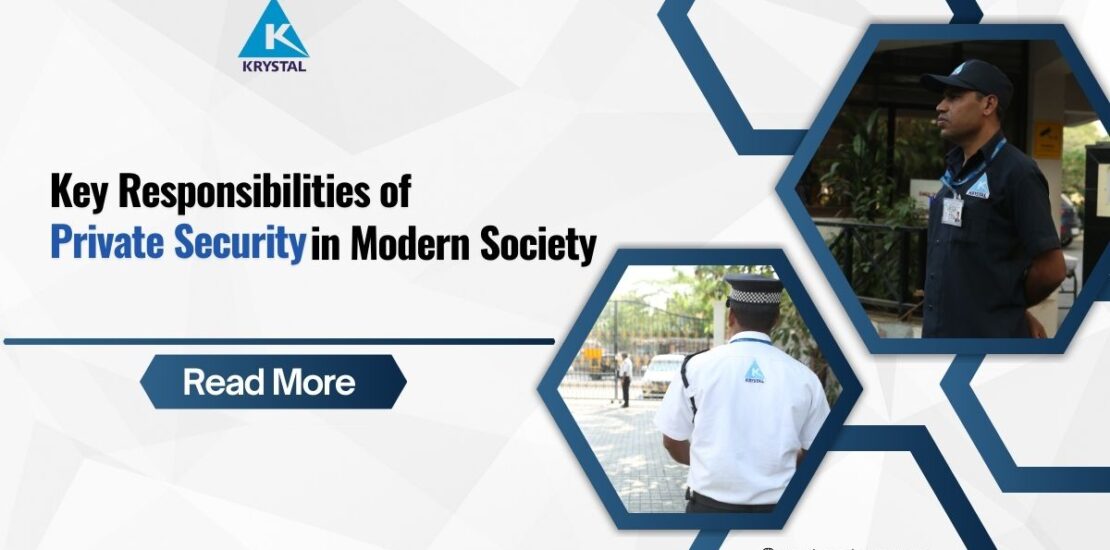Key Responsibilities of Private Security Firms in Modern Society.
31 January 2024

Introduction:-
In an era characterized by dynamic socio-economic landscapes and evolving security challenges, the significance of private security firms has reached unprecedented heights. As pillars of safeguarding the well-being of communities and businesses, these organizations shoulder multifaceted responsibilities that extend far beyond traditional security paradigms. The modern security landscape demands a proactive and adaptive approach, and private security firms play a pivotal role in fulfilling this need. From conducting rigorous risk assessments to embracing cutting-edge technologies, their responsibilities encompass a wide array of tasks aimed at ensuring the safety and resilience of our societies. This article explores the key responsibilities of private security firms in the contemporary context, shedding light on their indispensable contributions to the fabric of a secure and protected modern society.

Risk Assessment and Management:
Private security firms are entrusted with the responsibility of conducting thorough risk assessments to identify potential threats and vulnerabilities. This involves analyzing various factors, such as geographical location, industry-specific risks, and historical security incidents. By comprehensively understanding the risks, security professionals can develop tailored strategies to mitigate and manage potential threats. This proactive approach ensures a more secure environment for individuals and businesses alike.
Private Security Training and Development:
The effectiveness of a private security firm largely depends on the competence and readiness of its personnel. Training programs are designed to equip security officers with the necessary skills and knowledge to handle diverse situations, ranging from routine patrols to emergency response. Continuous development is essential to keep security personnel abreast of emerging trends, technologies, and threat landscapes. By investing in the ongoing education of their workforce, private security firms contribute to a higher standard of security services.
Utilization of Technology for Enhanced Security:
Embracing technological advancements is paramount for private security firms in the modern age. Surveillance cameras, access control systems, biometric authentication, and artificial intelligence are just a few examples of the cutting-edge technologies employed to enhance security measures. Integrating these tools not only strengthens the protective capabilities of private security but also allows for more efficient and proactive responses to potential threats.
Collaboration with Law Enforcement:
Private security firms serve as valuable partners to law enforcement agencies. Collaboration between the two ensures a seamless exchange of information and resources, contributing to a more comprehensive and coordinated approach to security. Private security firms often act as the first line of defense, and their cooperation with law enforcement agencies fosters a collective effort in preventing and responding to criminal activities. This collaborative approach is integral to maintaining public safety and order.
Crisis Management and Emergency Response:
Private security firms are at the forefront when it comes to crisis management and emergency response. Whether it’s a natural disaster, a security breach, or a medical emergency, these firms are trained to respond swiftly and effectively. Establishing clear communication channels, evacuation plans, and emergency protocols are part of their responsibilities. By having well-defined crisis management strategies in place, private security firms contribute to minimizing the impact of unforeseen events on the safety of individuals and assets.
Conclusion
In conclusion, the key responsibilities of private security firms in modern society are multifaceted and demand a comprehensive and adaptable approach. From risk assessment and personnel training to leveraging technology and collaborating with law enforcement, these organizations play an integral role in maintaining the safety and security of our communities. In an ever-changing world, the evolution and refinement of these responsibilities are essential to meet the challenges of the contemporary security landscape.
Similar articles

How Krystal Group's Payroll Management Services Can Boost Your Business Growth
Krystal Group, a leading provider of payroll management services, understands the critical role that payroll plays in the success of...
Read More
Payroll Management Services in India
Krystal Group simplifies payroll management. Payroll Management Services in India are fully automated by our strong back-end payroll engine. “KRYSTAL...
Read More
Payroll Management: The Ultimate Guide – Krystal Group
Krystal Group provides Payroll management services. Payroll management is a critical function within any organization, encompassing a wide range of...
Read More